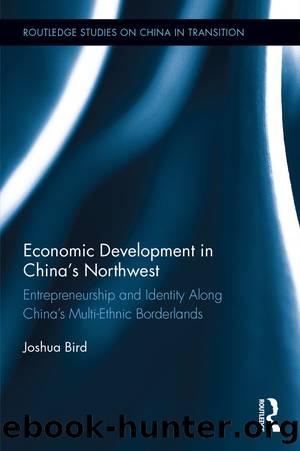Economic Development in China's Northwest: Entrepreneurship and Identity Along China's Multi-Ethnic Borderlands by Joshua Bird

Author:Joshua Bird [Bird, Joshua]
Language: eng
Format: epub
Tags: Ethnic Studies, Social Science, Political Science, World, Asian, Regional Studies, General
ISBN: 9781351703802
Google: HkgrDwAAQBAJ
Goodreads: 35637183
Publisher: Routledge
Published: 2017-07-06T00:00:00+00:00
Minority identity and the nature of economic engagement
The situation of Tibetan entrepreneurs in Qinghaiâs provincial capital of Xining provides a strong argument that minority nationality identity remains a powerful force shaping the behaviour of Chinaâs minority nationality entrepreneurs. Economic participation is experienced in line with oneâs minority nationality, with motivations, industry and market choice all influenced by the identity of the individual.
For Tibetan entrepreneurs in Xining, business opportunities â where they are perceived to exist at all â largely focus on the sale of Tibetan goods and services to the mainstream non-Tibetan market or the sale of products to the Tibetan market. This appeared to be true across generations. Older entrepreneurs, often more restricted by education and language deficiencies, showed a tendency to rely upon more traditional goods and services than their younger counterparts, but both groups shared a reluctance to attempt business outside a Tibetan paradigm. The Tibetan character of most Tibetan business is further reinforced by the high reliance on co-ethnic Tibetan staff, and the maintenance of strong links back to the densely concentrated Tibetan areas of their home.
The specific and unique challenges confronted by Tibetan entrepreneurs in Xining also limit the integrating effects of market engagement. Tighter regulation of domestic and international travel, and political sensitivity regarding core cultural industries impede the capacity of Tibetan entrepreneurs to maximise their business opportunities. Other more general obstacles, such as lower education rates, poorer Chinese language skills and geographical remoteness are not unique to Tibetans, but are suffered disproportionally by them as compared to Han Chinese. Finally, pre-existing cultural misgivings of entrepreneurship meant Tibetans were slower than many of Chinaâs other nationalities to take up the opportunities presented by Chinaâs economic growth, leaving them at a disadvantage that continues up to the present generation. It is therefore possible to assume that, as Hechter predicted, in the short term, the ethnic identities of Xiningâs Tibetans will persist regardless of economic development.
Download
This site does not store any files on its server. We only index and link to content provided by other sites. Please contact the content providers to delete copyright contents if any and email us, we'll remove relevant links or contents immediately.
Zero to IPO: Over $1 Trillion of Actionable Advice from the World's Most Successful Entrepreneurs by Frederic Kerrest(4570)
Machine Learning at Scale with H2O by Gregory Keys | David Whiting(4313)
Never by Ken Follett(3957)
Harry Potter and the Goblet Of Fire by J.K. Rowling(3857)
Ogilvy on Advertising by David Ogilvy(3622)
Shadow of Night by Deborah Harkness(3368)
The Man Who Died Twice by Richard Osman(3079)
Book of Life by Deborah Harkness(2939)
The Tipping Point by Malcolm Gladwell(2922)
Will by Will Smith(2920)
Purple Hibiscus by Chimamanda Ngozi Adichie(2854)
0041152001443424520 .pdf by Unknown(2846)
My Brilliant Friend by Elena Ferrante(2831)
How Proust Can Change Your Life by Alain De Botton(2814)
How to Pay Zero Taxes, 2018 by Jeff A. Schnepper(2655)
Hooked: A Dark, Contemporary Romance (Never After Series) by Emily McIntire(2554)
Rationality by Steven Pinker(2364)
Can't Hurt Me: Master Your Mind and Defy the Odds - Clean Edition by David Goggins(2341)
Borders by unknow(2315)
